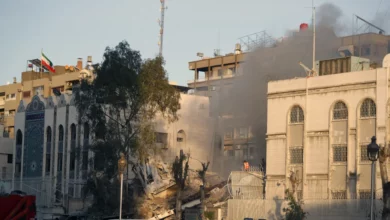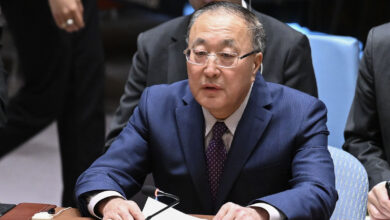DAMASCUS – Syrian forces launched assaults on flashpoint areas, killing at least two people as they pursued a crackdown on dissent ahead of expected mass protests after Ramadan Friday prayers, activists said.
The security force operations came in defiance of warnings to Syria by the United States that it will face further sanctions if it does not stop killing protesters.
A man was killed early Friday while trying to flee when security forces began arresting residents in the Damascus suburb of Saqba, according to Rami Abdel Rahman, head of the Britain-based Syrian Observatory for Human Rights.
The second death, that of a woman, occurred when security forces launched an operation at dawn in the town of Kahn Sheikhun in northwestern Idlib province, he told AFP.
"Dozens of tanks, troop carriers and civilian cars were used in the dawn assault on Kahn Sheikhun," Abdel Rahman said. "Intense gunfire was heard."
At least 16 people were killed in a crackdown on dissent in other hubs of protest across Syria on Thursday, according to rights activists.
The Observatory said on its website that a total of 2150 people have been confirmed dead since the protests began in mid-March, including 1744 civilians and 406 members of the security forces.
Protesters were expected to flood Syrian streets again after midday weekly prayers, setting the stage for further confrontation.
Facebook group The Syrian Revolution 2011, a driving force behind the anti-regime protests, said in a message posted on the Internet: "We only kneel before God."
It also urged Syrians to pursue anti-regime rallies throughout the holy Muslim fasting month of Ramadan which started 1 August, saying "every day in Ramadan is a Friday."
Friday – the weekly day of rest when key Muslim prayers are held – has become a focal point of the demonstrations, with hundreds of thousands pouring on to the streets each week.
With the West grappling with ways to pressure Damascus into ending the bloodletting, US Secretary of State Hillary Clinton on Thursday urged China, Russia and India to weigh in against President Bashar al-Assad's regime.
Clinton in an interview with CBS News suggested that China and India impose energy sanctions on Syria while she urged Russia to stop selling arms to Damascus, which has bought weapons from Moscow for decades.
"What we really need to do to put the pressure on Assad is to sanction the oil and gas industry. And we want to see Europe take more steps in that direction," Clinton said.
"And we want China to take steps with us. We want to see India, because India and China have large energy investments inside of Syria. We want to see Russia cease selling arms to the Assad regime," the top US diplomat said.
Her comments came as US officials said Washington has decided to call explicitly for Assad to step down.
The White House said President Barack Obama and Turkish Prime Minister Recep Tayyip Erdogan agreed during a phone call Thursday on the need for a "transition to democracy" in Syria.
The Obama administration has been steadily ratcheting up pressure on Assad, who has been deaf to growing international calls to stop the crackdown.
"The United States is looking to explicitly call for Assad to step down. The timing of that is still in question," according to a US official who did not rule out that the announcement could come next week.
"It's part of steps to increase the pressure given the ongoing brutality of the Assad regime," the official told AFP on the condition of anonymity.
Ignoring the growing international outrage, Assad pledged this week a relentless battle against "terrorist groups" Damascus says is fomenting a popular uprising across Syria.
State Department spokeswoman Victoria Nuland meanwhile said the US ambassador in Damascus personally warned Syrian Foreign Minister Walid Muallem on Thursday that Syria will face further sanctions if it does not stop killing protesters.
Robert Ford, the envoy who returned to Damascus last week after consultations in Washington, also urged Syria's top diplomat to ensure journalists can cover the protests.
As part of the crackdown, Abdel Karim Rihawi, head of the Syrian League for the Defence of Human Rights since 2004 and a key source of information for international media, was arrested on Thursday, activists said.




